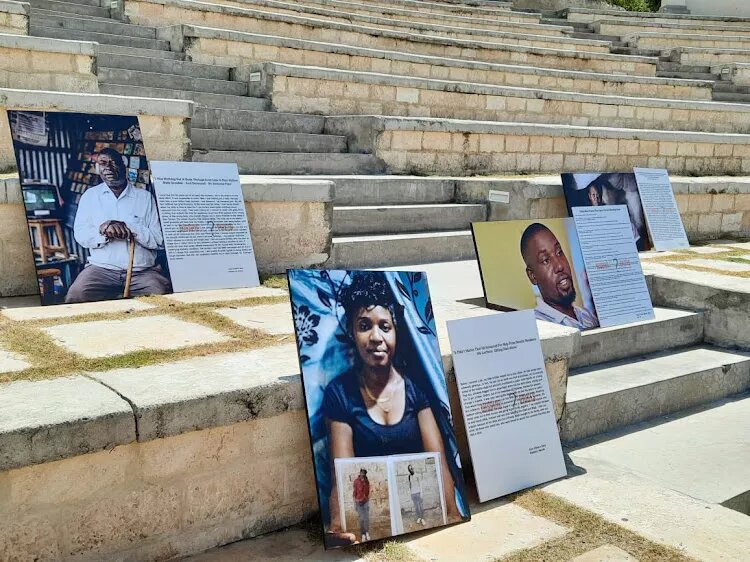
Many victims and survivors, together with families impacted by police brutality in Kenya, seldom get justice. Some of these survivors have lived to share horrifying stories of how they have suffered brutal beatings, unlawful arrests, and torture while in detention. Some bear the scars of careless shootings if they are lucky to escape death.
Police who mete out such extreme violence against the youth, especially in the grassroots, swear in the name of fighting crime, but why? Despite the cries from the community being loud enough for everyone to hear, the systems in place meant to protect the masses remain deaf, showing no intention or desire to truthfully serve Kenyans as their motto states – "utumishi kwa wote (service to all)."
On April 27, 2022, Missing Voices launched the 2021 annual report on police killings and enforced disappearances in Kenya. In this report, the stories of three mothers of victims of police killings in Kenya were heart wrenching.
The stories as recounted by Stella Marris, Effa Kwendo and Haluma Malucha speak of the extreme pain that the police and the Kenyan criminal justice system cause the people they are supposed to serve, especially based on their financial status.
Many of those impacted by police brutality come from humble backgrounds. They suffer in silence, with little to no emotional, mental, or financial support in their pursuit of justice for their kin.
Furthermore, the manner in which their cases are being addressed is very questionable. As told by the mothers of victims of police killings in the report, the entire process, from collecting evidence, recording witness statements, and filing the cases in court, is slow, arduous, and extremely frustrating. A criminal judge said that this messed-up process goes against their goal of getting justice because it could hurt their cases.
In the report, Missing Voices showed that 27 police officers have been found guilty and sentenced since 2016.
Sadly, however, it took five years on average to reach these convictions. In addition, these numbers are low compared to the total number of incidents and court cases that have been recorded and are going on right now.
When cases take this long to be resolved, the witnesses forget key details of the incident or specific information, families become fatigued, and the accused are allowed more time to tamper with evidence. Inevitably, the probability of conviction also becomes low, and the cycle of injustice continues.
So long as there are families and people who suffer injustices from the same institutions meant to protect them, it is impossible to truly state with conviction that we have achieved independence. These violent actions by the Kenyan police have turned many families into human rights activists, fighting for justice for their fallen kin, friends, or neighbors.
The Mothers of Victims and Survivors Network (MVSN) is such a group, where they work with volunteers and the public to push for police reform in their communities. The group helps victims and survivors of police violence to document incidents, i.e. through the filing of necessary paperwork with the police and other relevant authorities, such as The Independent Policing Oversight Authority (IPOA). They also go out of their way to help the victims and survivors attend court processes and offer comfort and counsel to these families.
Last year, the Mothers of Victims and Survivors Network (MVSN) launched a book titled "They Were Us: Stories of Victims and Survivors of Police Brutality in Kenya". The book highlights the 16 stories of 18 families in Nairobi who have fallen victim to the violent actions of the police.
Once again, the cries in the community can be heard, but unfortunately, the systems put in place to protect Kenyans are slow to act in wiping away the tears of all these victims. Tears in this sense are all the injustices, the pain, the fear, and the hurt felt by those who suffer as victims of rogue police actions or inaction. When will Kenyans stop crying? Who will wipe these tears away?
Even though the change may be gradual, we all have a role to play to achieve this.
To be a part of making the change, you can;
- Educate yourself. One needs to learn to first understand what needs to be done. The Missing Voices 2021 annual report summarises the underlying issues, including the laws governing police killings and enforced disappearances in Kenya.
The report also highlights the recommendations to address the systemic gaps that exist. They include calls to the National Assembly, the National Police Service, the Office of the Director of Public Prosecution, The Attorney General and The Judiciary.
- Sign petitions. Signing ongoing petitions is a way to increase awareness of the issue at hand. With mobilized support, petitions are presented to relevant authorities, such as parliament aid, to start the process of legal reform.
Missing Voices has an active petition on change.org to criminalize enforced disappearances in Kenya. The objective is to present this petition to parliament and push for the demands highlighted in the petition.
- Participate in digital advocacy. The online space has proven to be an effective civic platform to advocate for positive social change. The Missing Voices digital platforms have frequent updates on advocacy campaigns, reports of alleged police misconduct, follow up on trials, and share the work being done by grassroots human rights defenders.
- Volunteer. Get to know what the issues are facing your community and what is being done to address them. The Social Justice Centres Working Group is a great start! Identify which social justice centre is in your area and find ways to get involved.
By Kwoba Magero - Program assistant, Dialogue and Civic Spaces